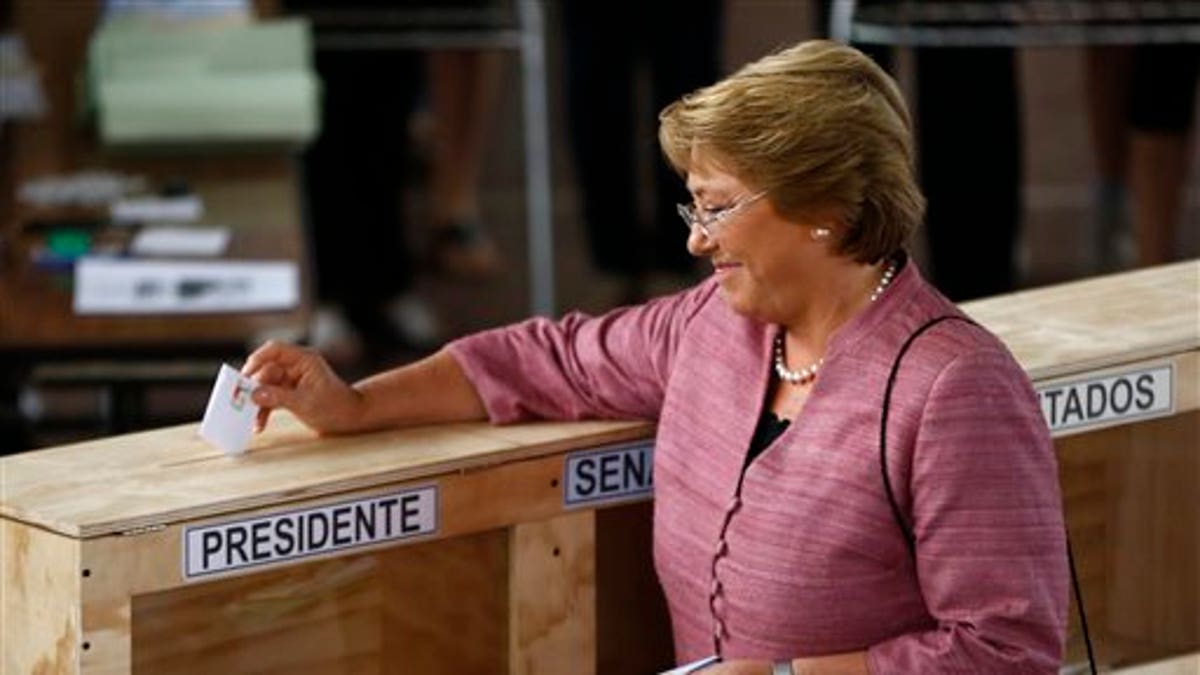
Presidential candidate Michelle Bachelet votes during the general elections in Santiago, Chile. (AP Photo/Victor R. Caivano)
SANTIAGO, Chile (AP) – Chileans were preparing to return Michelle Bachelet to the presidency on Sunday, hoping she can fulfill promises to reform a dictatorship-era system they blame for keeping the working classes poor and indebted to the privileged few.
Chile is the world's top copper producer and its fast-growing economy, low unemployment and stable democracy are the envy of Latin America. But millions of its citizens have taken to the streets in recent years, venting their frustration over the huge wealth gap between the rich and poor and a chronically underfunded education system.
Many voters blame policies imposed during Gen. Augusto Pinochet's dictatorship for keeping wealth and power in very few hands. His regime privatized natural resources and many government functions and ended the central control and funding of public schools.
Bachelet, 62, is a former political prisoner, pediatrician, defense secretary and Socialist Party stalwart who is a centrist at heart.
She left office with sky-high approval ratings after her 2006-2010 presidency despite failing then to bring about major changes in society. But this time, she's taken up the protesters' cause, vowing major changes in taxes and education to reduce the wealth gap.
Bachelet and her closest rival on Sunday, Evelyn Matthei, were childhood friends and daughters of generals who found themselves on opposite sides after Chile's 1973 coup, when Matthei's father ran the military school where Gen. Alberto Bachelet was tortured to death for remaining loyal to ousted President Salvador Allende.
The last survey by Chile's top pollster CEP found 47 percent of declared voters going for Bachelet, suggesting she has a good chance at an outright majority when voters who didn't reveal their preferences to pollsters cast ballots. Matthei got 14 percent in the poll, which had a 3 percentage point error margin. Seven other candidates trailed, although independents Franco Parisi and Marco Enriquez-Ominami were gaining ground on the right and left.
Chileans also will choose 120 members of the lower House of Congress and 20 out of 38 Senate seats on Sunday.
Unfortunately for Bachelet, her New Majority coalition won't be able to secure more seats unless it wins at least two-thirds of the votes in each district, under Pinochet's "binomial" electoral system, which was designed to frustrate change.
"You almost feel sorry for her because she's going to be stuck between the future and the past," said Peter Siavelis, a political science professor at Wake Forest University and author of "Democratic Chile: The Politics and Policies of a Historic Coalition".
"There all these demands in the streets for constitutional reform but she's facing a Congress that's going to be elected by the binominal elections system," Siavelis said. "There's not going to be a majority there. So the influence of the dictatorship is going to impact on her reforms."
Follow us on twitter.com/foxnewslatino
Like us at facebook.com/foxnewslatino




